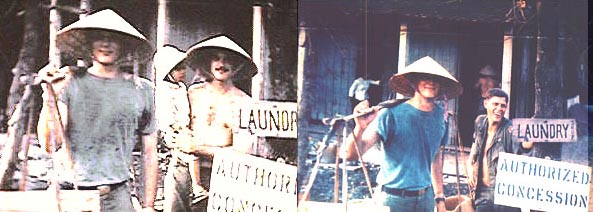
The hooch of the squad I was assigned to was a larger hooch which sat facing the street where some of the other squad members were in smaller hooches toward the back amid the rice paddies. Large army tent canvasses covered the rat-infested reed roofs. We had taken half of the village and made it our own. Supposedly, the displaced villagers were compensated, but if things went normally, the local officials took the loaf for themselves and left the crumbs for the villagers. The villagers were allowed to return during the daylight hours to carry on their businesses, many serving the needs of the occupying US Army. A laundry was housed in the adjoining building next to our hooch. During the day, dozens of Vietnamese would pass by the path running between the 1st Platoon hooches . This was the main path leading from the outlying farms to the main market in Rach Kien, which was on the Vietnamese side of the village, on the other side of the barbed wire. They would often be carrying goods to and fro, balancing two loads on a carrying plank across their shoulders or sometimes driving pigs before them, while the artillery provided the unceasing backbeat. The thought ran across my mind that the shells may be falling on one of the farmer’s hooches now at the market. Life had to go on despite the daily uncertainties and there we were in the same boat.

I was introduced to the members of the squad and the living quarters. There were about three free-standing fold-up cots and then there were frames built along the wall with stretchers attached and rubber mattresses on top. A single bare bulb dangled from one of the roof supports in the center. The electric power came from a single Diesel generator across the street which usually wasn’t powered up until the evening and became part of the constant background noise, along with the sporadic but never-ceasing artillery fire. There was an empty frame destined to be my bed space. Larry Rodgers, a soft-spoken, quiet guy from the rural Midwest volunteered to show me where to get a stretcher for my bunk. I found out that we had to carry a rifle with clip, no round in the chamber, and wear a steel pot whenever you left the area. Shirts were pretty much optional. Along the way, I noticed that many of the roofs along the way, especially noticeable in the red-tiled mess hall, had taken hits. Larry remarked, “Oh yeah, this place gets mortared quite a lot.” We walked up the street, past the mess hall, to the grave registration area. They supplied the stretchers. We opened the door to a small unlit room where the stretchers were stacked, vertically and pulled one out. I just figured, one stretcher is like the other, and we carried it back still folded. When I opened it up back in the hooch, ready to hoist it to its permanent resting place, I saw the huge dried blood stain in its center. I quickly folded it up and this time retrieved one by myself, checking it carefully before returning to the hooch. The sense of adventure and excitement I felt on arrival here was severely tempered by the brutal reality of war. This was serious.
